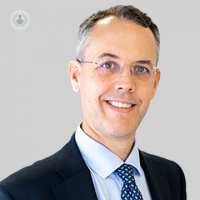What are clinical trials and how could they benefit you?
Written by:
The Sarah Cannon Research Institute is an innovative Oncology Trials Unit based in Harley Street, London, developing new cancer therapies. Professor Hendrik-Tobias Arkenau is a medical oncologist and the founding medical director of this institute. Here he explains what clinical trials are, the role they play in providing innovative cancer treatment, and who has access to them.

What are clinical trials?
At Sarah Cannon Research Institute, we are offering patients access to clinical trials of new cancer drugs. These are drugs which have not yet been approved by regulators, but are going through the formal testing and approval process.
We are currently offering clinical trials from phase-1 studies, through to randomised phase-2 and then later stage phase-3 studies in pretty much all tumour indications and covering all drugs classes, i.e. immunotherapy, antibodies, new chemotherapies and targeted drugs.
Once drugs have gone through these three phases, and if they are successful and better than standard of care, they may then go on to be approved by the regulators, which are usually the MHRA, European Medicines Agency, and the FDA.
We are a very dedicated trials unit and very technical in the sense of following tight governance and structures required by regulators. We are making sure that the drugs are getting approved efficiently and effectively to benefit our patients in the future.
What role do clinical trials play in cancer care?
In oncology, clinical trials are widely offered to patients as we are constantly trying to improve the outcome for our patients. Clinical trials might be offered as an alternative to standard of care treatment or based on the immune/genetic signature. Therefore, the interconnectivity between research and oncology care is very important, and this is what we are offering at Sarah Cannon, including genetic testing and immune profiling.
Who has access to clinical trials?
Here at Sarah Cannon, we are very proud that we have a clinical trials unit, which is effectively open to any patient that is getting referred to us. In theory, all patients with cancer can be referred to us.
Generally, 80% of our patients come from the NHS and around 20% are private or independent sector patients. Patients that come to Sarah Cannon are referred because their physicians feel that a particular trial could potentially benefit them and may even be better than standard of care treatment.
Why are clinical trials beneficial to patients?
In oncology, we're learning so quickly that we have to integrate new research as we go. Looking back at various standard of care treatments, in particular chemotherapy, they can often be between 20 to 40 years old. So, having access to novel treatments, such as immune therapies for example, and a new understanding of tumour biology gives patients a much higher chance of benefiting from these new treatments.
Similarly, if we think about targeted drugs in lung cancer, we know from the biology that it makes sense to block specific genetic alterations, so clinical trials are often much more beneficial than chemotherapy – they are more targeted and based on the underlying biology. We also see this in my field of caring for patients with gastrointestinal (GI) cancers. Patients who take part in clinical trials often benefit and have much better outcomes because we integrate research quickly into day-to-day practice.
If you are interested in being part of a clinical trial, request an appointment here at the Sarah Cannon Research Institute. Alternatively, you can book an appointment with Professor Hendrik-Tobias Arkenau by heading to his Top Doctors profile.


